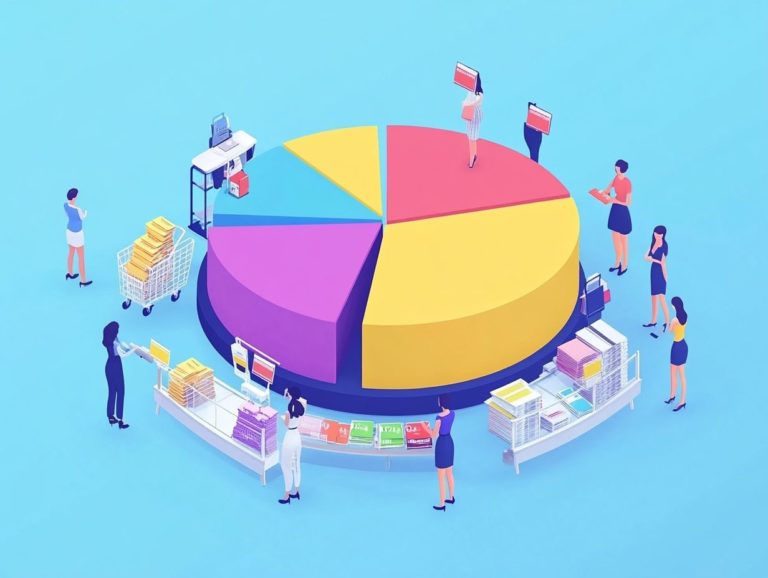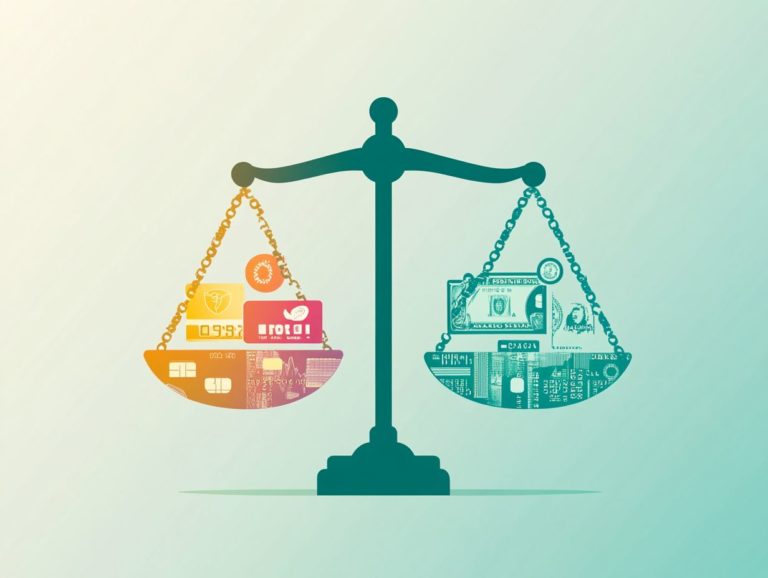The Basics of Credit Card Ownership for Teens
Navigating the world of credit cards can be an exhilarating yet daunting experience, particularly for teens embarking on their financial journeys.
Grasping the essence of what a credit card is and how it operates serves as the foundation for responsible usage. This article delves into the significance of credit for young adults, highlighting the importance of establishing a robust credit history and setting long-term financial aspirations.
You’ll uncover the essential responsibilities that come with credit card ownership, along with tips for selecting the right card and strategies for utilizing credit wisely. By the end, you will feel empowered to make informed choices and cultivate healthy financial habits.
Contents
- Key Takeaways:
- Understanding Credit Cards
- The Importance of Credit for Teens
- Responsibilities of Owning a Credit Card
- Choosing the Right Credit Card
- Tips for Responsible Credit Card Usage
- Frequently Asked Questions
- Curious about credit cards? Here s what you need to know!
- What is the minimum age requirement to have a credit card as a teen?
- What is the difference between a secured and unsecured credit card for teens?
- Is it important to pay off my credit card balance in full each month?
- What fees should I be aware of when owning a credit card as a teen?
- What should I do if I am unable to make a credit card payment on time?
Key Takeaways:

- Understanding the basics of credit cards is crucial for teens to make informed financial decisions.
- Building credit history and setting long-term financial goals are important reasons for teens to own a credit card.
- Responsible credit card ownership includes making timely payments, managing credit limits, and choosing the right card based on individual needs.
Understanding Credit Cards
Understanding credit cards is vital for anyone looking to master the nuances of personal finance, especially for young adults and college students.
A credit card lets you borrow money up to a limit and must be repaid with interest over time. Financial education about its usage is imperative.
This mechanism allows you to make purchases, manage your cash flow, and build your credit history as long as you practice responsible spending. Every transaction whether a small grocery run or a larger investment can impact your credit score, influenced by your timely repayments or outstanding balances.
Understanding the nuances of interest rates, minimum payments, and the perks of rewards programs is vital for maximizing the benefits of your credit card. Stay alert! The pitfalls can lead to serious financial trouble, especially from impulsive spending or accumulating debt beyond your means.
What is a Credit Card?
A credit card is a powerful financial tool that enables you to borrow money up to a specified limit. Remember, this borrowed amount must be repaid with interest over time.
This allows you to make purchases, manage cash flow, and build your credit history through responsible spending. Every transaction, big or small, can affect your credit score.
Understanding interest rates, minimum payments, and rewards programs is essential for maximizing your credit card benefits. Be cautious! The risks of impulsive spending can lead to significant financial issues.
How Does it Work?
Understanding how a credit card works is crucial for managing your personal finances effectively. It involves several important components, including interest rates, minimum payment requirements, and credit utilization.
A credit card allows you to borrow funds for purchases or cash advances, usually with a specific limit based on your credit score. When you make a transaction, the card network processes it swiftly through both the merchant s bank and your bank to confirm approval.
Timely payments are essential. Missing deadlines can lead to penalties and increased interest rates, quickly escalating your outstanding balances. Keeping your credit utilization low ideally under 30% of your credit limit can positively impact your credit score, enhancing your overall financial standing.
The Importance of Credit for Teens
The significance of credit for teens is paramount. Establishing a robust credit history early on sets the groundwork for future financial aspirations.
Whether it’s borrowing money for a car, applying for student credit cards, or making substantial purchases later in life, a strong credit foundation is crucial.
Providing financial education tailored to teenagers is essential; it equips them with the knowledge they need to make informed decisions about their personal finances.
Start your credit journey today and pave the way for a bright financial future!
Building Credit History

Building a strong credit history is essential for your financial responsibility, as it directly influences your credit score the number lenders use to evaluate your ability to repay loans and credit cards.
To establish this crucial foundation effectively, explore various strategies that enhance your creditworthiness and deepen your understanding of credit management. For example, becoming an authorized user on a responsible person’s credit card can provide immediate benefits; timely payments will positively impact your credit profile.
Applying for student credit cards tailored for beginners can create opportunities for you to build credit through everyday purchases.
These accessible options aid in cultivating a robust credit history and help you develop essential habits for future financial success.
Long-Term Financial Goals
Understanding the role of credit in achieving your long-term financial goals is essential for sustainable money management. It influences your budgeting skills, spending decisions, and overall financial planning.
By effectively managing your credit, you can pave the way toward significant milestones like home ownership and retirement. A solid credit score often dictates your loan eligibility and interest rates, making it much easier to finance a home or other large purchases.
Maintaining good credit opens doors to better investment opportunities, enhancing your retirement planning. This shows just how crucial it is to cultivate sound budgeting skills and informed financial strategies, giving you the power to leverage your credit to secure the financial future you desire and thrive in an ever-evolving economic landscape.
Responsibilities of Owning a Credit Card
Owning a credit card entails important responsibilities that demand a clear understanding of your financial obligations. This includes maintaining an impeccable payment history, effectively managing your credit limits, and exercising responsible consumer behavior to minimize the inherent risks associated with credit card use.
Making Payments on Time
Making timely payments is essential for maintaining a strong payment history, which directly affects your credit score and overall financial well-being.
Overlooking this responsibility may trigger a ripple effect impacting your credit rating and future ability to secure loans and favorable interest rates. Late payments can signal to lenders that you might be financially unreliable, complicating your chances of obtaining everything from a mortgage to a simple credit card. Late fees can add up fast, inflating your balance and adding unnecessary financial strain.
By recognizing the significance of meeting your financial obligations, you not only ensure your own stability but also cultivate trust with creditors, setting the stage for smoother transactions in the future.
Managing Credit Limit
Managing your credit limit well is key, as it directly influences your credit utilization ratio the amount of credit you use compared to your total credit limit and, in turn, your credit score.
By keeping your utilization ratio below 30%, you signal to lenders that you can handle credit judiciously, unlocking opportunities for better loan terms and lower interest rates down the line.
Staying on top of your credit limits is equally vital; exceeding these thresholds could lead to fees, interest rate increases, and even a decline in your overall credit score.
To maintain robust financial standing, consider adopting strategies such as regularly tracking your spending, setting alerts for when you re nearing your limits, and making timely payments.
Understanding the effects of requests to check your credit and managing multiple accounts with care are key components in achieving long-term credit health.
Choosing the Right Credit Card

Selecting the right credit card is an important financial decision that can profoundly influence your personal finance journey. It requires a careful look at different credit card options, including rewards points, interest rates, and additional features tailored to your unique needs.
Whether you re considering secured credit cards designed for newcomers or student credit cards crafted for college students, this decision deserves your thoughtful attention.
Types of Credit Cards
You ll find a variety of credit cards tailored to meet different needs. For instance, there are secured credit cards designed for those with little or no credit history, student credit cards specifically aimed at college students, and rewards cards that graciously offer points or cash back on your purchases.
If you’re looking to manage existing debt more effectively, balance transfer cards are your allies. They provide lower interest rates on transferred balances, making them perfect for consolidating your financial commitments.
For entrepreneurs and professionals, business credit cards come equipped with specialized tools and features like expense tracking and higher credit limits to support your growth ambitions.
Frequent travelers might be drawn to premium travel cards, which offer enticing perks, including airport lounge access and travel insurance, transforming your journeys into luxurious experiences.
By understanding the unique benefits of each type, you empower yourself to make informed financial decisions that truly align with your goals.
Factors to Consider
When evaluating credit card offers, you must consider several key factors, including interest rates, fees, rewards programs, and how each aligns with your financial goals and credit score.
Pay close attention to introductory offers, such as bonus rewards for new cardholders. These can deliver substantial short-term benefits. It s important for you to understand the terms and conditions associated with each card, including fees for late payments and how foreign transaction fees could affect your travel costs.
By carefully examining these critical elements, you can make an informed choice that not only enhances your purchasing power but also supports your long-term financial well-being.
Tips for Responsible Credit Card Usage
Using your credit card wisely is all about mastering some key money management skills. Focus on developing budgeting skills, enhancing your financial literacy, and closely monitoring your spending behavior.
This proactive approach will help you avoid the pitfalls of debt and maintain control over your finances.
Budgeting and Tracking Expenses
Establishing a budget is essential for responsible credit card usage. Diligently tracking your expenses is equally important. These practices not only help you stay aligned with your financial goals but also promote healthier spending habits.
By proactively analyzing your monthly income and expenditures, you can pinpoint areas where adjustments may be beneficial, ultimately guiding you toward wiser financial decisions. Techniques like the envelope system, which involves using physical envelopes to budget cash for different spending categories, or digital budgeting apps can simplify this process, making it easier for you to allocate funds for necessary expenses while also setting aside savings for your future objectives.
Regularly tracking your expenses fosters accountability and allows you to assess your finances in real time. This keeps you aware of your spending habits and enables informed adjustments. This proactive approach enhances your financial literacy, giving you the power to cultivate a deeper understanding of your financial landscape.
Avoiding Debt and Overspending

Avoiding debt and overspending is crucial for maintaining your financial health and ensuring responsible credit card use. Poor spending habits can quickly spiral into significant financial pitfalls.
To navigate this complex landscape, employ a variety of strategies. These strategies reinforce your financial discipline and encourage mindful spending.
Establishing clear spending limits is a foundational step. This enables you to prioritize essential expenses while keeping impulsive purchases in check.
Consider utilizing budgeting tools or apps. They provide a real-time snapshot of your expenditure patterns, enhancing your financial awareness.
Setting aside a small emergency fund acts as a buffer. It protects you against unexpected costs that could lead to a reliance on credit.
By approaching your personal finances with a strategic mindset, you can considerably reduce the risk of getting into debt and pave the way for a more secure financial future.
Frequently Asked Questions
-
Curious about credit cards? Here s what you need to know!
A credit card is a plastic card issued by a bank or financial institution that allows you to borrow money to make purchases. It is important for teens to have one as it can help them build credit history, learn financial responsibility, and provide emergency funds in case of unexpected expenses.
-
What is the minimum age requirement to have a credit card as a teen?
The minimum age requirement to have a credit card as a teen is typically 18 years old. However, some banks offer secured credit cards for teens as young as 16 with a parent or guardian as a co-signer.
-
What is the difference between a secured and unsecured credit card for teens?
A secured credit card requires a cash deposit as collateral, while an unsecured credit card does not. This means that with a secured credit card, your spending limit is usually equal to the amount of your deposit. In contrast, an unsecured credit card’s spending limit is determined based on your credit history and income.
-
Is it important to pay off my credit card balance in full each month?
Yes, paying your balance in full each month helps you dodge those pesky interest charges! It also keeps your credit utilization low, which is an important factor in determining your credit score. This promotes good financial habits and prevents you from accumulating debt.
-
What fees should I be aware of when owning a credit card as a teen?
As a teen, you should be aware of annual fees, late payment fees, and over-limit fees. It is crucial to read your credit card agreement carefully and understand the fees associated with your card to avoid any surprises.
-
What should I do if I am unable to make a credit card payment on time?
If you are unable to make a credit card payment on time, communicate with your credit card issuer as soon as possible. They may work out a payment plan or waive the late fee. It is also important to make timely payments in the future to avoid damaging your credit score.
Take control of your financial future today! Start implementing these strategies now!






